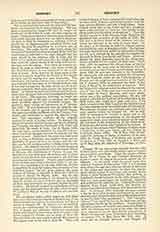

Gregory X, Pope; b. 1210; d. January 10, 1276. The death of Pope Clement IV (November 29, 1268) left the Holy See vacant for almost three years. The cardinals assembled at Viterbo were divided into two camps, the one French and the other Italian. Neither of these parties could poll the two-thirds majority vote, nor was either willing to give way to the other for the election of a candidate to the papacy. In the summer of 1270 the head and burgesses of the town of Viterbo, hoping to force a vote, resorted to the expedient of confining the cardinals within the episcopal palace, where even their daily allowance of food was later on curtailed. A compromise was finally arrived at through the combined efforts of the French and Sicilian kings. The Sacred College, which then consisted of fifteen cardinals, designated six of their body to agree upon and to cast a final vote in the matter. These six delegates met, and on September 1, 1271, united their ballots in choice of Teobaldo Visconti, archdeacon of Liege, who, however, was not a cardinal himself, nor even a priest. The new pontiff was a native of Piacenza and had been at one time in the service of Cardinal Jacopo of Palestrina, had become archdeacon of Liege, and accompanied Cardinal Ottoboni on his mission to England, and at the time of his election happened to be in Ptolemais (Acre), with Prince Edward of England, on a pilgrimage to the Holy Land. Receiving a summons from the cardinals to return immediately, he began his homeward journey on November 19, 1271, and arrived at Viterbo on February 12, 1272. He declared his acceptance of the dignity and took the name of Gregory X. On March 13 he made his entry into Rome, where on the nineteenth of the same month he was ordained to the priesthood. His consecration as pope took place on March 27. He plunged at once with all his energies into the task of solving the weighty problems which then required his attention: the restoration of peace between Christian nations and princes, the settlement of affairs in the German empire, the amendment of the possesses the great merit of having again made mode of life among clergy and people, the union of the Greek Church with Rome, the deliverance of Jerusalem and of the Holy Land. As early as the fourth day after his coronation he summoned a general council, which was to open at Lyons on May 1, 1274 (see Councils of Lyons). In Italy the pope sought to make peace between the Guelphs and Ghibellines, whose factional war raged chiefly in Tuscany and Lombardy. Against the city of Florence, the burgesses of which resisted these efforts to bring about a reconciliation, he issued a decree of excommunication.
After the death of Richard of Cornwall (1272) Gregory advised the German princes to select a new sovereign and refused the demand of Alfonso of Castile, rival of Richard, for recognition as emperor. Rodenburg edited 485 letters of Rudolf of Hapsburg having been elected on September 29, 1273, Gregory X immediately recognized him and invited him to Rome to receive the imperial crown. The pope and the emperor met at Lausanne in October of 1273. Gregory was then returning from the Council of Lyons. Rudolf took here the customary oaths for the defense of the Roman Church, took the cross, and postponed until the following year his journey to Rome. The pope obtained from Alfonso of Castile the renunciation of his claims to the German crown.
From the very beginning of his pontificate Gregory sought to promote the interests of the Holy Land. Large sums were collected in France and England for this crusade. A resolution adopted at the Council of Lyons, which opened on May 7, 1274, provided that one-tenth of all benefices accruing to all churches in the course of six years should be set aside for the benefit of the Holy Land, the object being to secure the means of carrying on the holy war. This tithe was successfully raised, and preparations were at once made in France and England for the expedition, which unfortunately was not carried out. The ambassadors of the Grecian emperor, having arrived in Lyons on June 24, swore, at the fourth sitting of the council (July 6) that the emperor had renounced the schism, and had returned to the allegiance due the Holy See. But this union, entered into by Michael Palieologus for purely political reasons, was in no sense destined to endure. At the close of this council over which Gregory had presided in person, he travelled by way of Lausanne, Milan, and Florence as far as Arezzo, where he died on January 10, 1276. Though his pontificate prove so short, the results which he achieved were of far-reaching consequence, and he succeeded in maintaing unimpaired peace and harmony. On account of his unusual virtues he is revered as a saint in Rome and in a number of dioceses (Arezzo, Piacenza, Lausanne), his feast being 16 Feburary.
J. P. KIRSCH

